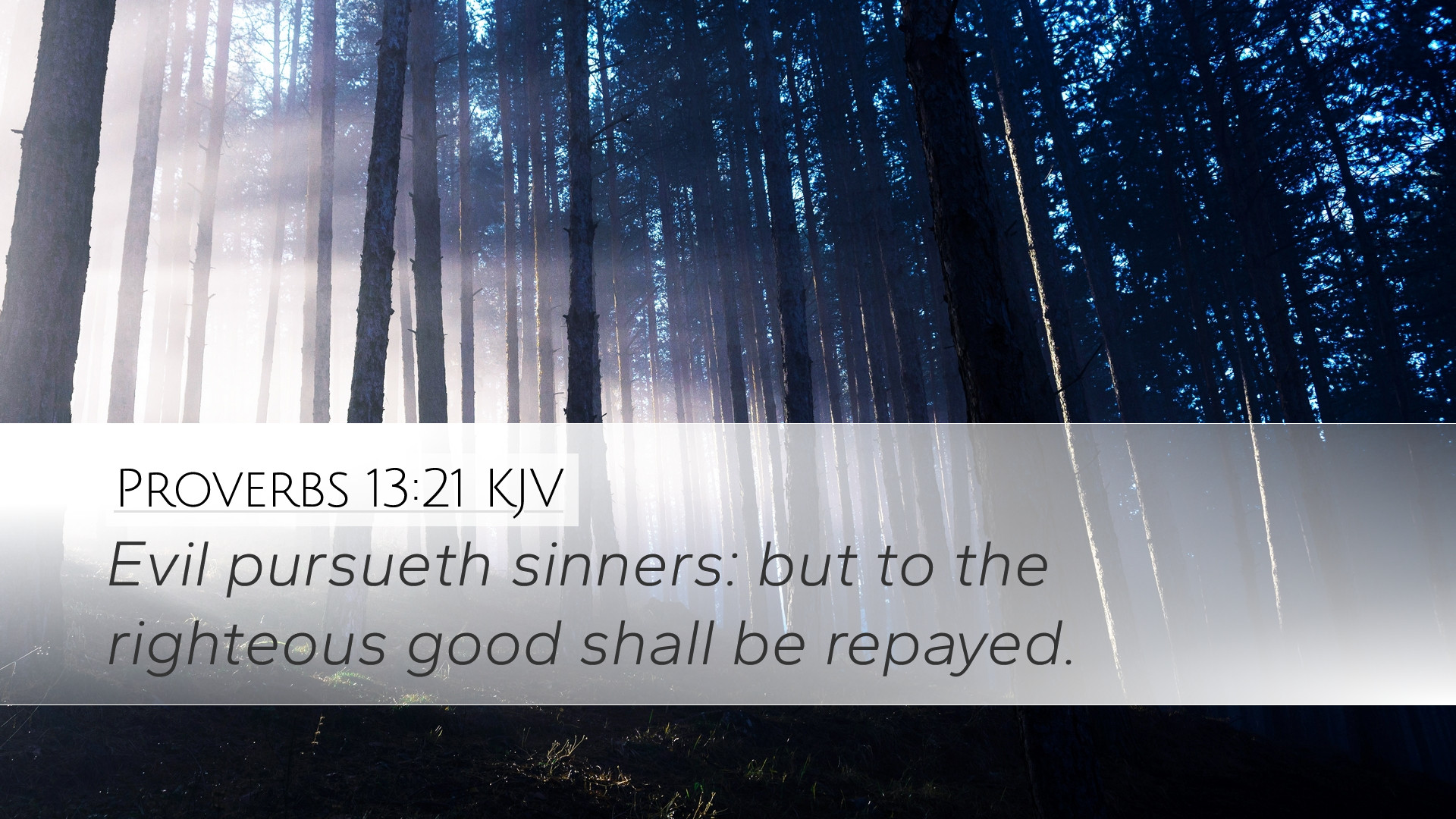Commentary on Proverbs 13:21
Verse: "Evil pursueth sinners: but to the righteous good shall be repayed." (Proverbs 13:21, KJV)
Introduction
This verse from Proverbs encapsulates a central theme of biblical wisdom literature: the moral order governed by God, where the consequences of one's actions play a critical role. In this commentary, insights from noted public domain theologians such as Matthew Henry, Albert Barnes, and Adam Clarke will be synthesized to extract meaningful theological reflections.
Exegesis of Proverbs 13:21
The verse presents a stark juxtaposition between the destiny of sinners and that of the righteous. The language used creates a vivid imagery of pursuit and retribution:
- Evil Pursueth Sinners: The term "pursueth" indicates an active and relentless nature of evil seeking out those who practice sin.
- Righteous Good Shall Be Repayed: On the other hand, the promise of recompense for the righteous underscores a principle of divine justice and reward.
Theological Insights
Matthew Henry highlights the certainty of the consequences of sin, emphasizing the idea that sinners cannot escape the inevitable repercussions of their actions. He states, "Though they may seem to flourish for a while, their end will be destruction."
Albert Barnes elaborates on the idea of evil as an unyielding force, suggesting that it actively seeks to ensnare sinners, indicating a spiritual battle between good and evil in which the righteous are divinely protected.
Adam Clarke adds depth by asserting that the phrase “good shall be repaid” reflects more than mere transactional justice; it embodies a gracious recompense from God, who rewards faithfulness and obedience.
Pursuit of Evil
The notion of evil pursuing sinners draws attention to the following points:
- Unyielding Nature of Sin: Sin is not passive; it actively chases and ensnares individuals, highlighting the peril of a life lived apart from divine guidance. As Henry notes, "There is a consuming nature to evil that leads to suffering and despair."
- Impact of Sin on Community: The pursuit of sin leads not only to personal downfall but also to communal degradation, as the consequences of individual actions ripple through society.
- Divine Judgment: This pursuit represents not only moral degradation but also the divine order that God has established, consistent with themes found in other biblical texts.
The Righteous and Their Reward
In contrast to the fate of sinners, the righteous are promised a positive outcome:
- Assurance of Divine Goodness: The righteous will undoubtedly experience good. Barnes emphasizes that this goodness includes both earthly blessings and spiritual rewards, pointing to the holistic nature of God's rewards.
- Recompense as a Reflection of God's Nature: Clarke posits that God's character is inherently benevolent, and thus He cannot help but reward those who are faithful to Him.
- Community of the Righteous: The righteous do not only enjoy personal blessings but also contribute to the upliftment of society, creating a counter-narrative to the destructive path of the wicked.
Practical Applications
For pastors, theologians, and students, several applications arise from this text:
- Preaching the Consequences of Sin: The reality of sin's pursuit should be emphasized in preaching to create a sense of urgency and awareness in the congregation.
- Encouragement to the Righteous: Providing assurance to those who live righteously that their efforts are not in vain encourages perseverance in faith and good deeds.
- Teaching about Divine Justice: Emphasizing God's role in administering justice and recompense cultivates trust in His providence and moral order.
- Community Building: Fostering a community that embodies righteousness can counter the evils that pursue others, thus acting as a refuge for those in despair.
Conclusion
Proverbs 13:21 powerfully encapsulates the dichotomy between the consequences of sin and the rewards of righteousness. It serves as a reminder of the moral framework established by God, where every action has repercussions. The insights drawn from prominent theologians guide us in understanding not just the theological implications but also the practical outworking of this truth in our lives and communities. May this understanding compel us toward righteousness, motivating both personal reflection and communal action.


